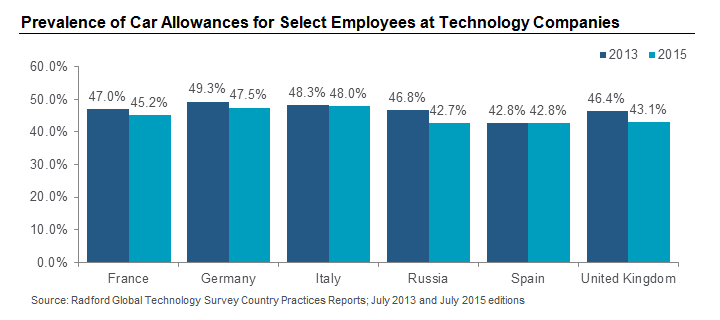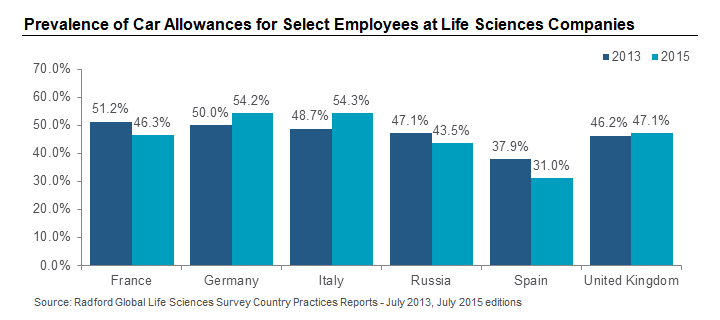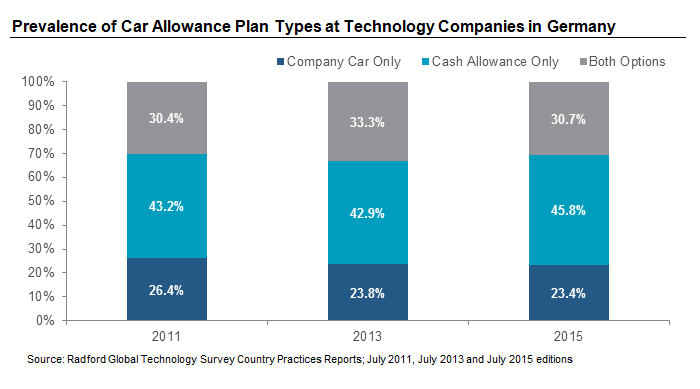With sluggish growth rates in Europe, some are beginning to question the value of corporate car allowances. Yet, new Radford data suggests car perks aren’t disappearing anytime soon.

Corporate car allowances may seem like a luxury in an era of slow to moderate growth in Europe, but new data from Radford shows practices aren’t changing as rapidly as some might think at European technology and life sciences companies. Across a selection of key European markets, between 42.7% and 48.0% of technology companies and 31.0% and 54.3% of life sciences companies offered car allowances to some of their employees in 2015. These benefits come in several forms, including access to a company car for business and personal use, or as cash allowances that can be applied toward a car. (Of note, both the Radford Global Technology Survey and the Radford Global Life Sciences Survey track car allowances for all local nationals, excluding sales and field engineering employees. Sales employees are covered in the Radford Global Sales Survey.)
For technology firms, the values cited above generally reflect slight declines in the prevalence of car allowances since 2013. However, for life sciences companies, the data is mixed; the prevalence of car allowances increased in three surveyed markets and dropped in three others. To illustrate these recent trends, the charts below display the prevalence of corporate car allowances in France, Germany, Italy, Russia, Spain and the United Kingdom.


In the first chart, covering technology sector companies, we see that the prevalence of corporate car allowances declined most visibly in Russia and the United Kingdom from 2013 to 2015, although by only four and three percentage points, respectively. Interestingly, while Spain is just now emerging from its own financial crisis and prolonged recession, it was the only nation where the prevalence of car allowances did not decline; the data was flat from 2013 to 2015.
Turning to the second chart and the life sciences sector, we find that practices changed more dramatically from 2013 to 2015. The prevalence of car allowances increased in Germany, Italy and the United Kingdom, climbing by as many as five percentage points in Italy. Conversely, the prevalence of car allowances dropped in France, Russia and Spain, with Spain seeing a decline of nearly eight percentage points.
While the results cited above may not seem dramatic at first glance, they certainly suggest European technology and life sciences companies should at least review car allowance practices on an annual basis. In the technology sector, there appears to be a slow but consistent movement away from car allowances, and this trend could potentially accelerate in the years ahead. For life sciences companies, the need to benchmark regularly is even clearer— practices change more sporadically and vary widely from market to market.
To dig a bit deeper, we next wondered if shifts in the delivery of car allowance perquisites (providing company cars vs. cash allowances) might indicate subtle, but perhaps more important changes in practice. We decided to focus this research on the technology sector in Germany, a market where one might assume there would be more resistance to eliminating or changing corporate car allowances.
Looking at the data presented in the chart below, we find that delivery practices in Germany are indeed shifting gradually over time. The use of corporate cars is declining while the use of cash allowances for cars is increasing. There could be a variety of motives behind these changes— many of which may be circumstantial to each organization. Companies could be looking for ways to reduce costs by eliminating company cars, but at the same time, cash allowances provide employees with more flexibility to drive vehicles of their choice.

Looking Forward
The list of reasons to abandon car allowance programs is long and growing. Institutional investors and proxy advisory firms continue to question the practice, employees without access to car allowances have expressed internal pay equity concerns, administering programs can be expensive, and some studies suggest car benefits may not be fulfilling their intended goal of attracting and retaining employees. For example, a 2011 WorldatWork survey on car benefits around the world found they were effective in boosting employee satisfaction, but not a driving factor in attracting talent to a company or in retaining top performers.
Yet, despite all of the concerns listed above, roughly 40-50% of technology and life sciences companies in Europe continue to offer car allowances, and the pace of change in most markets is slow. Car allowances persist for a number of reasons: First, car allowances are a decades-old legacy perk that long-tenured and senior employees have come to expect. Next, the potential cost savings of eliminating car allowances are often negated, at least in the short-term, by salary adjustments designed to offset the loss of the benefit. And finally, in some countries, companies receive tax benefits for offering car allowances. These factors make change difficult, assuming it is even desired.
Amidst this complex mix of issues, one thing is clear. Technology and life sciences firms in Europe are paying more attention to market dynamics around car allowances and increasingly looking for way to adjust practices. This could mean exploring reduced program eligibility or adjusting the delivery of car allowance offerings.
To learn more about participating in a Radford survey, please contact our team. To speak with a member of our compensation consulting group, please write to [email protected].
Related Articles